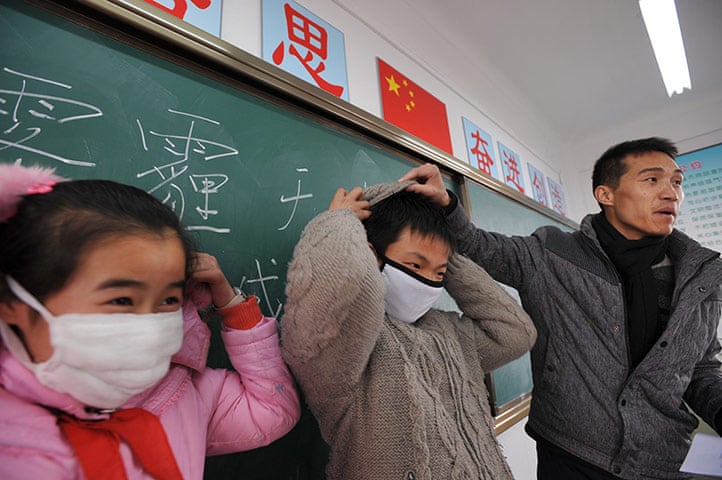
Beijing’s recent red alerts and ensuing school closures may have been designed, in part, to keep children safe at home and away from heavy smog. But many parents say more drastic measures are needed to truly protect students from pollution on a day to day basis.Xudong "Clive" Zhang, whose daughter is enrolled in a public kindergarten in Beijing’s Haidian district, tells beijingkids: "I think schools should have at least one air purifier for each class. The kids need some protection."
However, such standards have yet to be met in the Chinese public school system. A recent CCTV report detailed the frustration of a group of Shanghai parents whose proposal to have air purifiers installed in every classroom was denied by the authorities because of “potential safety risks.” A Global Times editorial, meanwhile, decried the bureaucracy that has stalled such anti-pollution efforts, while a China Daily editorial insisted that the authorities should "heed parents’ call to better protect students from smog."
Many of those parents are not content to wait for the authorities to take action. Xiaoli Tang, whose daughter attends third grade at a public school in Haidian, says she and a few fellow parents banded together to purchase two air purifiers for their children’s classroom. But they could only do so if all student’s parents signed a consent form, and even after the device was installed the issue was still not entirely resolved."One purifier had some problems, so we had to return it. Maybe next semester we will buy another one, because one is not enough to protect them," she says. Worse still: the needed maintenance of those devices fell on already overworked teachers. Xiaoli explains: "One purifier stopped working, and it gave the head teachers many troubles because they had to clean it and call the service phone number to fix it."
That is unacceptable for Xiaoli, who says: "I think all these things should be done by the government, not the children or parents."And yet, both Zhang and Xiaoli say they are happy to contribute to an air purifier fund in order to protect their children. But an equally contentious issue lies in the instalation such devices. The aforementioned parent group in Shanghai not only insisted that air purifiers were a necessity at their children’s school, but also volunteered to pay for the machines. However, the authorities even refuted that offer, writing in a reply: “Purifiers tend to be too large in size to be positioned in a crammed classroom without endangering children’s safety. In addition [it would]put strain on the school’s old electricity network, posing an extra threat."
Sometimes the opposition lies not with the authorities, but with fellow parents. Jerry Chan, one of my colleagues at The Beijinger, took to our blog’s comment section to write about such a standoff at his daughter’s local public primary school in Chaoyang. His post outlined how he and some fellow parents offered to buy an air purifier for the classroom, only to have their proposal blocked by another parental group who "decided they didn’t want to pay, so they ran to the Ministry of Education and complained that the school was ‘charging extra fees.’" He added that those gripes prompted the school’s administration to ban air purifiers from all classrooms, "because they are afraid of getting in trouble with the Ministry of Education," compelling Chan and his wife to get "our daughter out of this school as soon as possible, but words cannot describe the ignorance and cowardice at play here…"
In a subsequent interview, Chan went on to describe his frustration about "how general ignorance could cause people to consider their pocketbooks over the health of their children – particularly since we hadn’t even asked them to pay. They just assumed this was to be the case." Troubling as that outcome was, it also spoke to an even deeper problem. He explains: "Aside from not wanting to pay, I think they are generally uninformed about the dangers of air pollution on their childrens’ health."
Hu Tao recently dealt with a similar spat at his at his daughter’s primary school in Haidian. He recalls meeting with fellow parents who hoped to purchase a pricey purifier, only to have others complain about the cost."They wanted to buy a cheaper one, which we finally ended up doing," he says, adding that thrifty resolution left him with little consolation. "The teachers told us that they turned it on when there was smog, but I’m not sure how effective this cheaper purifier is."
Xiaoli is optimistic that such frugal attitudes will eventually change. She’s also pragmatic enough to know that she and likeminded parents need to push for such breakthroughs now. As public pressure mounts for authorities to install purifiers at schools, and studies by publications like Environmental Health Perspectives reveal the harm that pollution inflicts on not only the lungs, but also the mind (the study said: "On average, cognitive scores were 61 percent higher" on days with better air quality), she believes the government will have massive incentive to act.
In the meantime, she is more than content to do her part to ensure her daughter’s safety, explaining: "The government should do this, but the bureaucracy is so big, and developing countries like ours have so many issues, so they need time. So it can’t be the government’s fault entirely if the people do not try to do something. Everyone needs to try and work together to give our kids the proper care."
Photo: The Guardian



